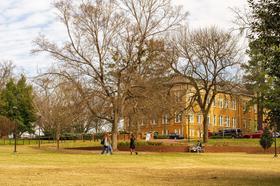Serving 378 students in grades 6-8, Carol City Middle School ranks in the bottom 50% of all schools in Florida for overall test scores (math proficiency is bottom 50%, and reading proficiency is bottom 50%).
The percentage of students achieving proficiency in math is 46% (which is lower than the Florida state average of 52%). The percentage of students achieving proficiency in reading/language arts is 34% (which is lower than the Florida state average of 52%).
The student-teacher ratio of 16:1 is lower than the Florida state level of 17:1.
Minority enrollment is 99% of the student body (majority Black), which is higher than the Florida state average of 65% (majority Hispanic and Black).
Quick Facts (2026)
- Grades: 6-8
- Enrollment: 378 students
- Student-Teacher Ratio: 16:1
- Minority Enrollment: 99%
- Overall Testing Rank: Bottom 50% in FL
- Math Proficiency: 46% (Btm 50%)
- Reading Proficiency: 34% (Btm 50%)
- Science Proficiency: 40-44% (Btm 50%)
- Source: National Center for Education Statistics (NCES), FL Dept. of Education
Top Rankings
Carol City Middle School ranks among the top 20% of public schools in Florida for:
Category
Attribute
Percent Eligible For Free Lunch
School Overview
Carol City Middle School's student population of 378 students has declined by 16% over five school years.
The teacher population of 24 teachers has declined by 14% over five school years.
Grades Offered
Grades 6-8
(No virtual instruction)
(No virtual instruction)
Total Students
378 students
Gender %
Total Classroom Teachers
24 teachers
School Calendar
School Rankings
Carol City Middle School ranks within the bottom 50% of all 3,662 schools in Florida (based off of combined math and reading proficiency testing data).
The diversity score of Carol City Middle School is 0.33, which is less than the diversity score at state average of 0.70. The school's diversity has stayed relatively flat over five school years.
Overall Testing Rank
#2626 out of 3662 schools
(Bottom 50%)
(Bottom 50%)
Math Test Scores (% Proficient)
46%
52%
Reading/Language Arts Test Scores (% Proficient)
34%
52%
Science Test Scores (% Proficient)
40-44%
52%
Student-Teacher Ratio
16:1
17:1
American Indian
n/a
n/a
Asian
n/a
3%
Hispanic
19%
37%
Black
80%
21%
White
1%
35%
Hawaiian
n/a
n/a
Two or more races
n/a
4%
All Ethnic Groups
Participates in the National School Lunch Program (NSLP)
Yes
Eligible for Free Lunch
68%
47%
Eligible for Reduced Lunch
3%
4%
School Statewide Testing
School District Name
Source: National Center for Education Statistics (NCES), FL Dept. of Education
Profile last updated: 02/09/2025
Frequently Asked Questions
What is Carol City Middle School's ranking?
Carol City Middle School is ranked #2626 out of 3,662 schools, which ranks it among the bottom 50% of public schools in Florida.
What schools are Carol City Middle School often compared to?
Carol City Middle Schoolis often viewed alongside schools like Excelsior Prep Charter School Of Miami Gardens, Lake Stevens Middle School by visitors of our site.
What percent of students have achieved state testing proficiency in math and reading?
46% of students have achieved math proficiency (compared to the 52% FL state average), while 34% of students have achieved reading proficiency (compared to the 52% FL state average).
How many students attend Carol City Middle School?
378 students attend Carol City Middle School.
What is the racial composition of the student body?
80% of Carol City Middle School students are Black, 19% of students are Hispanic, and 1% of students are White.
What is the student-teacher ratio of Carol City Middle School?
Carol City Middle School has a student ration of 16:1, which is lower than the Florida state average of 17:1.
What grades does Carol City Middle School offer ?
Carol City Middle School offers enrollment in grades 6-8 (No virtual instruction).
What school district is Carol City Middle School part of?
Carol City Middle School is part of Miami-Dade School District.
School Reviews
2 10/10/2025
Im going to this school when this corona stuff end so yeah im be in 6th grade.
Review Carol City Middle School. Reviews should be a few sentences in length. Please include any comments on:
- Quality of academic programs, teachers, and facilities
- Availability of music, art, sports and other extracurricular activities
Recent Articles

Public School Transportation & Commute Planning Guide
Learn how public school transportation and commute planning can help families prepare for the coming school year safely and efficiently.

New Public School Safety Protocols 2025–26 Guide
Learn how new public school safety protocols for 2025–26 affect students, parents, and schools nationwide.

How Technology Transforms Education in 2025
Explore how technology shapes learning today, with updated data, policy context, trends, and real-world implications for students, educators, and families.









